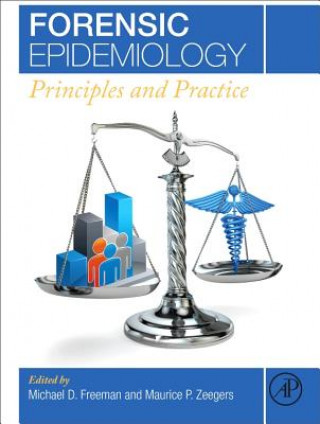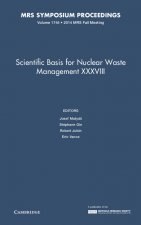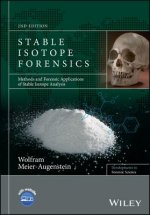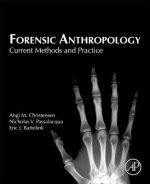
Kód: 02931314
Forensic Epidemiology
Autor Michael Freeman
It is an inescapable fact that causation, both generally (in populations), and specifically (in individuals), cannot be observed. Rather, causation is determined when it can be inferred that the risk of an observed injury or disea ... celý popis
- Jazyk:
 Angličtina
Angličtina - Vazba: Pevná
- Počet stran: 434
Nakladatelství: Elsevier Science Publishing Co Inc, 2016
- Více informací o knize

3293 Kč

Skladem u dodavatele v malém množství
Odesíláme za 3-5 dnů
Potřebujete více kusů?Máte-li zájem o více kusů, prověřte, prosím, nejprve dostupnost titulu na naši zákaznické podpoře.
Přidat mezi přání
Mohlo by se vám také líbit
-

Natural History of Birds
2070 Kč -

Religion and Superstition in Reformation Europe
815 Kč -

Local Activity Principle: The Cause Of Complexity And Symmetry Breaking
5311 Kč -

Conduct Literature for Women, Part III, 1720-1770 vol 5
3271 Kč -

Scientific Basis for Nuclear Waste Management XXXVIII: Volume 1744
3271 Kč -

Quantifying Aesthetics of Visual Design Applied to Automatic Design
3313 Kč -

Empty Bones and Other Stories
389 Kč
Darujte tuto knihu ještě dnes
- Objednejte knihu a zvolte Zaslat jako dárek.
- Obratem obdržíte darovací poukaz na knihu, který můžete ihned předat obdarovanému.
- Knihu zašleme na adresu obdarovaného, o nic se nestaráte.
Více informací o knize Forensic Epidemiology
Nákupem získáte 329 bodů
 Anotace knihy
Anotace knihy
It is an inescapable fact that causation, both generally (in populations), and specifically (in individuals), cannot be observed. Rather, causation is determined when it can be inferred that the risk of an observed injury or disease from a plausible cause is greater than the risk from other plausible causes. While many causal evaluations performed in forensic medicine are simplified by fact that the circumstances surrounding the onset of an injury or disease clearly rules out competing causes (e.g. a death following a fall) there are many cases that present a more complicated picture. It is these types of investigations, in which an analysis of comparative levels of risk from competing causes is required to arrive at a reliable and accurate determination of cause, that forensic epidemiology (FE) is directed at. In Forensic Epidemiology the authors present the legal and scientific theories underlying the methods by which risk is used in the investigation of individual causation. Methods and principles from epidemiology are combined with those from a multitude of other disciplines, including general medicine, pharmacology, forensic pathology, biostatistics, and biomechanics, inter alia, as a basis for investigating the plausibility of injury and disease exposures and mechanisms. The ultimate determination of the probability of causation (PC) results from an assessment of the strength of association of the investigated relationship in the individual, based on a comparison between the risk of disease or injury from the investigated exposure versus the risk of the same disease or injury occurring at the same point in time in the individual, but absent the exposure. The principles and methods described in Forensic Epidemiology will be of interest to those who work and study in the fields of forensic medicine, epidemiology, and the law. Historical perspective on how epidemiologic evidence of causation has been used in courts in U.S. and EuropeTheory and science underlying the use of risk to assess individual causationPrimer on epidemiologic methods, and various measures used to arrive at individualized comparative risk assessments and PCThe use of statistical methods applied to publicly available data for ad hoc analysis of PC applicable to the specific circumstances of a caseBackground on adjunctive disciplines, including forensic pathology, death investigation, biomechanics, and survival analysis
 Parametry knihy
Parametry knihy
Zařazení knihy Knihy v angličtině Society & social sciences Social services & welfare, criminology Crime & criminology
3293 Kč
- Plný název: Forensic Epidemiology
- Podnázev: Principles and Practice
- Autor: Michael Freeman
- Jazyk:
 Angličtina
Angličtina - Vazba: Pevná
- Počet stran: 434
- EAN: 9780124045842
- ISBN: 0124045847
- ID: 02931314
- Nakladatelství: Elsevier Science Publishing Co Inc
- Hmotnost: 1082 g
- Rozměry: 199 × 244 × 25 mm
- Datum vydání: 04. May 2016
Oblíbené z jiného soudku
-

All That Remains
303 Kč -

Forensics
303 Kč -

Dictionary of Forensic Science
406 Kč -

Psilocybin Mushroom Bible
632 Kč -

Inside the Criminal Mind (Newly Revised Edition)
388 Kč -

Papillon
212 Kč -

The Anatomy of Motive
270 Kč -

Yakuza
924 Kč -

American Kingpin
433 Kč -

Donnie Brasco
357 Kč -

Deranged
447 Kč -

Circle of Treason
615 Kč -

Stable Isotope Forensics - Methods and Forensic Applications of Stable Isotope Analysis 2e
4618 Kč -

Forensic Anthropology
2913 Kč -

Narconomics
433 Kč -

Orange Is the New Black
268 Kč -

Peaky Blinders: the Real Story
250 Kč -

Narcoland
336 Kč -

Cosa Nostra: A History of the Sicilian Mafia
361 Kč -

Yakuza Moon: Memoirs Of A Gangster's Daughter
297 Kč -

El Narco
357 Kč -

Why Kids Kill
538 Kč -

G-Man
862 Kč -

Are Prisons Obsolete?
303 Kč -

Guantanamo Diary
276 Kč -

American Marriage
187 Kč -

Spam Nation
437 Kč -

Confessions Of A Yakuza
262 Kč -

Snowing in Bali
276 Kč -

Anatomy of Violence
410 Kč -

Profiling The Criminal Mind
463 Kč -

Journalist And The Murderer
276 Kč -

Simpson's Forensic Medicine, 14th Edition
1369 Kč -

School Shooters
920 Kč -

Black Mass
250 Kč -

Nutshell Studies of Unexplained Death
1216 Kč -

Cybercrime and Cyber Warfare
4229 Kč -

Howard Marks' Book Of Dope Stories
490 Kč -

Vinny Gorgeous
494 Kč -

Corporation
357 Kč -

Sexual Homicide: Patterns and Motives- Paperback
730 Kč -

Criminology: A Very Short Introduction
250 Kč -

Zero Zero Zero
303 Kč -

Forensic Psychology: A Very Short Introduction
250 Kč -

Sherlock: The Casebook
618 Kč -

Hotel K
276 Kč -

American Desperado
223 Kč -

At The Devil's Table
303 Kč -

Deadly Medicines and Organised Crime
1265 Kč
Osobní odběr Praha, Brno a 12903 dalších
Copyright ©2008-24 nejlevnejsi-knihy.cz Všechna práva vyhrazenaSoukromíCookies


 Vrácení do měsíce
Vrácení do měsíce 571 999 099 (8-15.30h)
571 999 099 (8-15.30h)